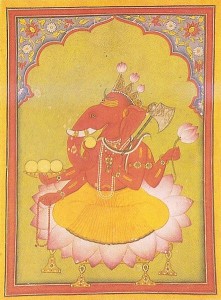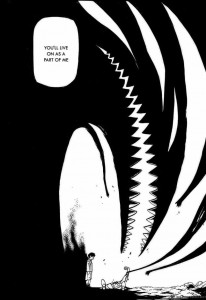 Recently I finished reading the Manga series FullMetal Alchemist by Hiromu Arakawa, a coming of age story of two brothers who try to bring back the dead. It’s an interesting comic with complex characters, including seven “homunculi” who represent the deadly sins–the worst being Pride, shown in this panel (click to see a bigger image), who sucks up other people to gain their powers. The seven deadly sins also appear on Selected Shorts this week, in stories about other ways (besides necromancy) that we grow up and lose our innocence. Tobias Wolff’s “Smorgasbord,” performed by Rene Auberjonois, is set in a boarding school and runs the gammot of Gluttony, Pride, Sloth, Lust, Envy, Greed and Wrath. “Football” by Elizabeth Crane, performed Martha Lavey, imagines a “second life,” where the narrator dreams of what it would be like to live a simple, small town existence. I was away at Chicago’s AWP conference last weekend, and so missed writing up the most recent Selected Shorts, which featured Mark Kurlansky’s “The Leopard of Ti Morne,” read by Stephen Lang, and John O’Hara’s “Graven Image,” read by Denis O’Hare. You can listen to both episodes on the Selected Shorts website, or by tuning in to your local public radio station. In the meantime, to combat your own seven deadly sins, try the less exciting but still powerful seven heavenly virtues: Chastity, Temperence, Charity, Diligence, Patience, Kindness and Humility.
Recently I finished reading the Manga series FullMetal Alchemist by Hiromu Arakawa, a coming of age story of two brothers who try to bring back the dead. It’s an interesting comic with complex characters, including seven “homunculi” who represent the deadly sins–the worst being Pride, shown in this panel (click to see a bigger image), who sucks up other people to gain their powers. The seven deadly sins also appear on Selected Shorts this week, in stories about other ways (besides necromancy) that we grow up and lose our innocence. Tobias Wolff’s “Smorgasbord,” performed by Rene Auberjonois, is set in a boarding school and runs the gammot of Gluttony, Pride, Sloth, Lust, Envy, Greed and Wrath. “Football” by Elizabeth Crane, performed Martha Lavey, imagines a “second life,” where the narrator dreams of what it would be like to live a simple, small town existence. I was away at Chicago’s AWP conference last weekend, and so missed writing up the most recent Selected Shorts, which featured Mark Kurlansky’s “The Leopard of Ti Morne,” read by Stephen Lang, and John O’Hara’s “Graven Image,” read by Denis O’Hare. You can listen to both episodes on the Selected Shorts website, or by tuning in to your local public radio station. In the meantime, to combat your own seven deadly sins, try the less exciting but still powerful seven heavenly virtues: Chastity, Temperence, Charity, Diligence, Patience, Kindness and Humility.
Archive: Author: Hannah
Gowanus, pt. 46
Selected Shorts: It Chooses You

A friend of mine used to collect snow globes. He had a whole shelf dedicated to their display, and people would bring globes back from around the world to add to his collection. Las Vegas, Rio, Pompeii, Beijing. Another shelf was added, and then another, until an entire wall of his apartment was full of these small underwater scenes, shimmering with flecks of white. They would have been a perfect addition to Miranda July’s new book, It Chooses You, featured on this week’s edition of Selected Shorts. Part book, part art-project, It Chooses You began while July was struggling to write the screenplay for The Future. As a distraction, she sought out people selling items in her local Pennysaver, interviewing and photographing them and their objects. These interviews were performed last season at Symphony Space in New York City, with Miranda July playing herself, and the actors Tom Bloom, Mia Dillon, Rebecca Naomi Jones, Adrian Martinez, Olga Merediz and Tom Nelis playing the interesting strangers July met through the classifieds. The items for sale—Care Bears and old leather jackets and photograph albums—act as keys, unlocking each person’s history. And like that wall of snow globes, every object represents an adventure, carried from another part of the world to its exact location, where it seems to gain its true meaning, like a priceless artifact in a museum. So tune in this week, and take a closer look at the tchotchkes gathering dust around you. They may be revealing more than you think. The Selected Shorts site is still out of service, but you can listen in at WNYC or your local public radio station.
Ganesh
Selected Shorts: Personal Libraries
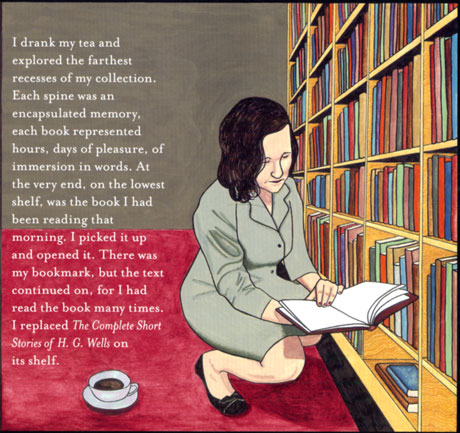 Every time I move my personal library shifts. I donate books, give others away to friends, and the most important ones I hold on to. I have boxed endless volumes and carried them up endless flights of stairs: a cavalcade of Best American Short Story collections, Tintin comics, four different editions of Jane Eyre, dictionaries upon dictionaries, books signed by friends and authors I’ve waited in line for, Cervantes and Tolstoy, Barthleme and Borges, Hempel and O’Connor, The Elements of Style,my Biology and Zoology textbooks, and a slim edition of Auden. Each book kept and shelved has a reason for being there. A story behind it. But what about the other books I’ve read? All the library books I’ve enjoyed and returned, books I’ve perused in bookstores, books given away or borrowed? Those books may not be physically with me anymore, but sometimes I can feel their ghosts. In her graphic novel, The Night Bookmobile, (performed by Christina Pickles on this week’s Selected Shorts), Audrey Niffeneger imagines a complete personal library–full of everything her narrator has ever read–newspapers and receipts and diaries and of course, all of her books. Taken together, they tell the story of her life, as well as the life she did not lead because she was reading. The second story on this week’s show also follows a woman on a mysterious adventure–from a traffic jam in downtown Tokyo into a strange, alternative world: 1Q84. This opening from Haruki Murakami’s new and much talked-about novel is performed by Miriam Silverman. The Selected Shorts site is still out of service, but you can listen in at WNYC or your local public radio station. And if you’re in New York this Wednesday night, I hope you’ll join me at a special live Selected Shorts performance featuring great actors reading work from One Story authors. For complete details and tickets, go here.
Every time I move my personal library shifts. I donate books, give others away to friends, and the most important ones I hold on to. I have boxed endless volumes and carried them up endless flights of stairs: a cavalcade of Best American Short Story collections, Tintin comics, four different editions of Jane Eyre, dictionaries upon dictionaries, books signed by friends and authors I’ve waited in line for, Cervantes and Tolstoy, Barthleme and Borges, Hempel and O’Connor, The Elements of Style,my Biology and Zoology textbooks, and a slim edition of Auden. Each book kept and shelved has a reason for being there. A story behind it. But what about the other books I’ve read? All the library books I’ve enjoyed and returned, books I’ve perused in bookstores, books given away or borrowed? Those books may not be physically with me anymore, but sometimes I can feel their ghosts. In her graphic novel, The Night Bookmobile, (performed by Christina Pickles on this week’s Selected Shorts), Audrey Niffeneger imagines a complete personal library–full of everything her narrator has ever read–newspapers and receipts and diaries and of course, all of her books. Taken together, they tell the story of her life, as well as the life she did not lead because she was reading. The second story on this week’s show also follows a woman on a mysterious adventure–from a traffic jam in downtown Tokyo into a strange, alternative world: 1Q84. This opening from Haruki Murakami’s new and much talked-about novel is performed by Miriam Silverman. The Selected Shorts site is still out of service, but you can listen in at WNYC or your local public radio station. And if you’re in New York this Wednesday night, I hope you’ll join me at a special live Selected Shorts performance featuring great actors reading work from One Story authors. For complete details and tickets, go here.
Selected Shorts: Healing Hearts
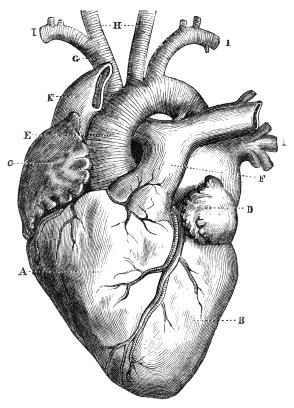 When a heart is broken it goes dark. A wave of depression, self-doubt and rage separates it from the world. But once the wave passes, something amazing can happen. The knowledge of that pain–the pain of loving someone, and losing them–can deepen our understanding, make us live our lives more carefully and more closely, and give us a greater appreciation and sympathy for those around us. If you can live through your heart being broken, if you can hold on through that darkness, when you finally emerge from the other side, you will be different. You will be reborn. The stories on Selected Shorts this week find ways to heal (and learn) after losing love. Allegra Goodman’s “La Vita Nuova,” performed by Marin Ireland, takes its title from Dante’s famous text, which translates to “The New Life,” and is about a young woman’s recovery after being left at the altar. Our second story, “The Secret Goldfish” by David Means, performed by Charles Keating, follows a family’s trajectory of loss through the medium of a neglected goldfish. The fish keeps going, just like our hearts, despite all the scum on the walls of its tank. And I think it is the better for it. The Selected Shorts site is down for the moment, but you can tune in to this show at your local public radio station, or hop on over to WNYC to listen to the stories right now.
When a heart is broken it goes dark. A wave of depression, self-doubt and rage separates it from the world. But once the wave passes, something amazing can happen. The knowledge of that pain–the pain of loving someone, and losing them–can deepen our understanding, make us live our lives more carefully and more closely, and give us a greater appreciation and sympathy for those around us. If you can live through your heart being broken, if you can hold on through that darkness, when you finally emerge from the other side, you will be different. You will be reborn. The stories on Selected Shorts this week find ways to heal (and learn) after losing love. Allegra Goodman’s “La Vita Nuova,” performed by Marin Ireland, takes its title from Dante’s famous text, which translates to “The New Life,” and is about a young woman’s recovery after being left at the altar. Our second story, “The Secret Goldfish” by David Means, performed by Charles Keating, follows a family’s trajectory of loss through the medium of a neglected goldfish. The fish keeps going, just like our hearts, despite all the scum on the walls of its tank. And I think it is the better for it. The Selected Shorts site is down for the moment, but you can tune in to this show at your local public radio station, or hop on over to WNYC to listen to the stories right now.
Selected Shorts: Jacques Cousteau
When I was a kid, I did not want to be a writer. I wanted to be Jacques Cousteau. I watched old repeats of his TV show, and dreamed of scuba diving with whales. Cousteau seemed to have it all wrapped up—as an inventor, explorer, and activist. It’s no wonder that his life inspired Wes Anderson to make The Life Aquatic, and T.C. Boyle to write “Rapture of the Deep,” featured on this week’s Selected Shorts. Performed by our own Isaiah Sheffer, this hilarious story imagines a mutiny taking place on the Calypso, over the only thing Frenchmen value more than adventure or romance: croissants, pâté, and a nice Bordeaux. In this fictional turn, Cousteau becomes a nemesis to his hungry crew but retains his dignity and honor, along with his stylish cap and pipe. The second story in our program also features food as an emotional turning point, in “Wanting an Orange,” by Larry Woiwode, performed by Michael Keck. Make your journey through stormy seas and kitchens this week, on podcast, or at your local public radio station.
Selected Shorts:
what we talk about when we talk about love
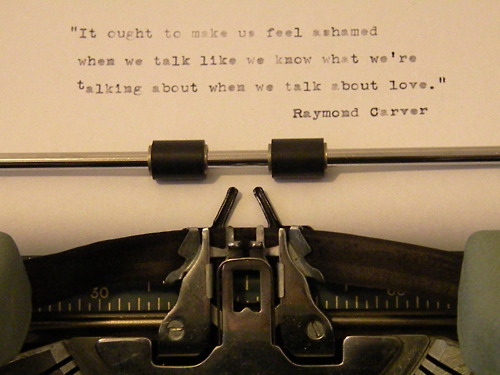
With Valentine’s Day around the corner, and all the stores full of hearts and candy, Selected Shorts turns its mind to stories of love. But as anyone who has ever been in love knows, it is a complicated business, and often more like the day after Valentine’s Day, when those heart-shaped boxes get moved to the discount aisle. There, under the fluorescent lights, love gets a more realistic viewing, the flaws laid bare along with the sweetness. Raymond Carver’s “What We Talk About When We Talk About Love” (performed this week by the great Leonard Nimoy) is famous for looking at love straight in the face and not flinching. (The story was also made famous in this New Yorker article, which revealed the behind-the-scenes relationship between Raymond Carver and his long-time editor, Gordon Lish.) Writers around the world have been heavily influenced by this seemingly simple tale about two couples drinking and swapping stories, including Nathan Englander, who titled his latest collection, What We Talk About When We Talk About Anne Frank. The second selection in our Valentine’s Day offering is “The Getaway” by Dorothy Thomas, performed by Mia Dillon. Here a lonely housewife looking for romance and excitement tries to run away from home, only to find that the hang-on-to-your-ankles, refusing to budge, kicking and roaring kind of love that comes with family is usually the kind that lasts. Download these great love stories via podcast, or listen the old-fashioned way, on your local public radio station.
Gowanus, pt.45
Selected Shorts: Haruki Murakami

Last year, I was in Alaska for a while. The glaciers I saw were the most brilliant blue–and as I watched them break apart (folks call it “calving”) all I could think of was the history of that ice–time and pressure had turned it into something beautiful, and now it was crumbling apart, after thousands of years. The image came back to me as I listened to Haruki Murakami’s story “Ice Man,”performed by Jane Curtin on Selected Shorts –a love story between a woman and a man made of ice. Murakami has an imagination like no other, and the ability to capture that middle ground between waking and sleeping, reality and dreams. This week’s episode is dedicated entirely to his world, with the second story, “Lederhosen,” performed by Aasif Mandvi. If you aren’t familiar with Murakami’s work, I’d suggest starting with his author interview over at The Paris Review, and then download our free podcast. It’s snowing here in Brooklyn and all over the East Coast. Stay in, stay warm and turn on your radio.

